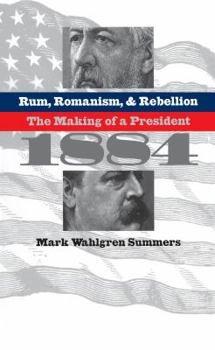Rum, Romanism, and Rebellion: The Making of a President, 1884
Select Format
Select Condition 
Book Overview
The presidential election of 1884, in which Grover Cleveland ended the Democrats' twenty-four-year presidential drought by defeating Republican challenger James G. Blaine, was one of the gaudiest in American history, remembered today less for its political significance than for the mudslinging and slander that characterized the campaign. But a closer look at the infamous election reveals far more complexity than previous stereotypes allowed, argues...
Format:Paperback
Language:English
ISBN:0807848492
ISBN13:9780807848494
Release Date:March 2000
Publisher:University of North Carolina Press
Length:408 Pages
Weight:1.30 lbs.
Dimensions:0.9" x 6.2" x 9.3"
Customer Reviews
0 rating





